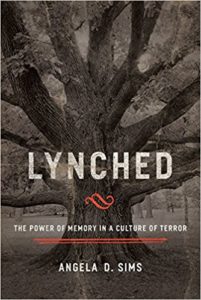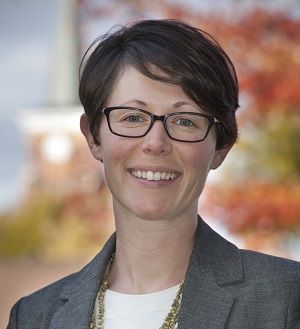Reckoning with Challenging Truths: White College Women Read Lynched by Kathleen Gallagher Elkins

This past spring semester, I taught a course in which Angela Sims’ book Lynched was an assigned text. For three weeks, four senior Theology & Religious Studies majors worked through Sims’ analysis of the memory work associated with a lynching culture, frequently making connections to modern neo-lynchings. It was the most somber unit of an already difficult course, which was a seminar focused on the theme of Religion, Violence, and Non-Violence. The course was made more complicated and painful by the recent 2016 election and the increasing visibility of white nationalists and hate crimes nationwide.
On the first day of that course unit, I asked students to recall in which educational settings they had encountered the history of lynching. They agreed that it was infrequently or never mentioned; they had learned about slavery and the Civil War, then Jim Crow and the Civil Rights Movement. The Jim Crow era was presented as an age of segregation, but students did not remember discussing the systemic violence that was part and parcel of that history, reflecting what Sims describes as a “history, and thus education, [that] is often determined and transmitted via a predetermined sanitized curriculum as a way to silence truth” (21). In general, the historical narratives my students described were narratives of improvement: slavery was bad, but things have gotten steadily better. My public-school experiences in the ‘80s and ‘90s were similar to my students’ in the 2000s: whitewashed and sanitized. I was prepared, then, for their expressions of shock and disbelief, because I remember feeling the same way when I encountered the history of lynching in seminary. This encounter was, in part, thanks to a conversation over dinner one night with Angela Sims, who was describing her dissertation work on Ida B. Wells.
Knowing that students had not encountered the history of lynching elsewhere, we started our conversation in class by watching Nina Simone’s version of Strange Fruit and discussed the recent (at the time) news that singer Rebecca Ferguson had agreed to sing at Donald Trump’s inauguration only if she were allowed to sing the same song. (Apparently, the inauguration committee declined her offer.) We also watched a short PBS about the lynching memorial, plus looked at a map of known lynchings. Our guiding questions here were similar to what Sims teases out from her oral history work: when do we choose to remember and when do we choose to forget? At what points is it appropriate to remember painful and unjust histories? Why do we have selective amnesia about certain parts of history, especially U.S. history as it relates to racial injustice? And how do people live in the face of such terror without being “consumed or defined by dehumanizing behavior” (xv)?
At the end of the course unit, I asked students to reflect on the value of reading Lynched in this particular class (in which we had also read works by Rita Nakashima Brock & Rebecca Parker, Irfan Omar & Michael Duffey, and Courtney Martin, among others). Students articulated the value of knowing U.S. history more deeply and critically than they had before, especially seeing the ways that religious values played a role in surviving lynching cultures. We had often focused on the harm that religions can do when they are weaponized (and, of course, the Bible has frequently been used to justify slavery and segregation). Students appreciated seeing that religion could also be used to energize “an ethic of resilient resistance” (125) among communities experiencing racialized terrorism. They also reflected on the ways that other countries have dealt more forthrightly with their histories of violence (e.g. through Holocaust memorials and museums, or Truth & Reconciliation Commissions in countries like South Africa, Chile, El Salvador, Argentina, and others) and agreed that the U.S. should learn to do the same.
At the end of the course unit, we had the opportunity to teleconference with Sims, a rare treat for our students. They nervously prepared their questions (it’s hard to be an undergraduate and to talk to the author about her book!), and then asked her about various aspects of the work: the issue of reparations, the question of representation in her oral history work, how communities heal from trauma, and the role of churches in memorializing this history.
After hanging up with Angela, we had a rich discussion debriefing our call and our work with her book. Students agreed that it was among the most difficult topics we considered that semester, but also one of the most productive. It was especially challenging, given the composition of our class: we were five white women in northeast Wisconsin discussing the history of lynching (and their professor is a scholar of early Christianity, so not at all an expert on race in the U.S.). It had the potential to be a sanitized and detached discussion, given our context and social location, but it wasn’t at all. This unit of the class challenged all of us, me included, to think about our complicity in systems of violence and the ways that our presence as white women can be used to create additional systems of violence, connected to what Sims notes about “the guise of protecting white female virtue” (44). Given the elections results (the presidential election in November 2016, of course, and more recently, in local/state elections this past week), I have a strong conviction that white women in particular need to reckon with this history of racialized terror and violence, as well as our complicity in it. Reading Lynched with my class and facing our history with honesty was an opportunity to do just that.
Kathleen Gallagher Elkins is Assistant Professor of Theology & Religious Studies at St. Norbert College in De Pere, Wisconsin. In 2013, she completed her doctoral studies in New Testament & Early Christianity at Drew University, with a concentration in Women’s & Gender Studies. Her forthcoming book, Mary, Mother of Martyrs: How Motherhood Became Self-Sacrifice in Early Christianity, will be published by Feminist Studies in Religion Books. Kathleen is grateful to the students in her 2017 capstone course for their insightful discussions about Lynched.

